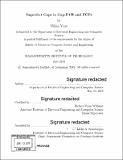Imperfect gaps in Gap-ETH and PCPs
Author(s)
Vyas, Nikhil(Electrical engineer and computer scientist)Massachusetts Institute of Technology.
Download1125006408-MIT.pdf (1.812Mb)
Other Contributors
Massachusetts Institute of Technology. Department of Electrical Engineering and Computer Science.
Advisor
Richard Ryan Williams.
Terms of use
Metadata
Show full item recordAbstract
In this thesis we study the role of perfect completeness in probabilistically checkable proof systems (PCPs) and give a new way to transform a PCP with imperfect completeness to a PCP with perfect completeness, when the initial gap is a constant. In particular, we show that PCP[subscript c,s][r, q] [mathematical symbol] PCP[subscript 1,s'][r + 0(1), q+ 0 (r)] for c - s = [omega](1) which in turn implies that one can convert imperfect completeness to perfect in linear-sized PCPs for NTIME[0(n)] with a 0(log n) additive loss in the query complexity q. We show our result by constructing a "robust circuit" using threshold gates. These results are a gap amplification procedure for PCPs (when completeness is imperfect), analogous to questions studied in parallel repetition [21] and pseudorandomness [141. We also investigate the time complexity of approximating perfectly satisfiable instances of 3SAT versus those with imperfect completeness. We show that the Gap-ETH conjecture without perfect completeness is equivalent to Gap-ETH with perfect completeness; that is, MAX 3SAT(1 - [epsilon], 1 - [delta]) for [delta] > [epsilon] has 2⁰([superscript n])-time algorithms if and only if MAX 3SAT(1, 1 - [delta]) has 2⁰([superscript n])-time algorithms. We also relate the time complexities of these two problems in a more fine-grained way, to show that T₂ (n) </= T₁ (n(log log n)⁰(¹)), where T₁(n), T₂(n) denote the randomized time-complexity of approximating MAX 3SAT with perfect and imperfect completeness, respectively. This is joint work with Mitali Bafna.
Description
Thesis: S.M., Massachusetts Institute of Technology, Department of Electrical Engineering and Computer Science, 2019 Cataloged from PDF version of thesis. Includes bibliographical references (pages 45-47).
Date issued
2019Department
Massachusetts Institute of Technology. Department of Electrical Engineering and Computer SciencePublisher
Massachusetts Institute of Technology
Keywords
Electrical Engineering and Computer Science.